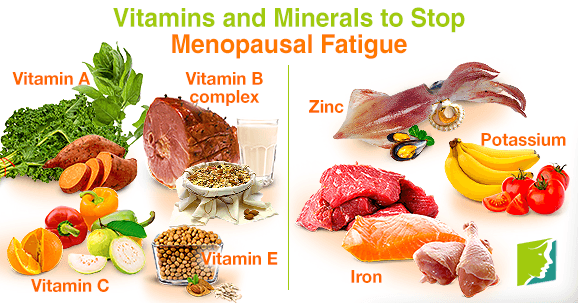Fatigue is an overall feeling of tiredness, exhaustion, and decreased energy levels. It's one of the most commonly reported symptoms of menopause, and impacts as many as 80% of women. Typically caused by fluctuations of estrogen and progesterone, it can also be a result of lifestyle factors like insufficient sleep, stress, and poor diet. This article features a list of vitamins and minerals that can help prevent menopausal fatigue.
Vitamin A
A fat-soluble, antioxidant vitamin, vitamin A helps protect the body against viruses and free radicals by enhancing the immune system and preventing illnesses. Kale, spinach, and sweet potatoes are all good sources of vitamin A.
Vitamin B Complex
Vitamin B complex combines vitamin B6 and vitamin B12, among others, to support metabolic functions and regulate the body's energy. Vitamin B helps the body convert carbohydrates and fat into energy. Whole grains, milk, and ham are all good sources of vitamin B. However, B12 is not found in plant sources, so vegans may have to supplement it.
Vitamin C
This antioxidant vitamin strengthens immune system and prevents fatigue caused by infections. Vitamin C also increases the absorption of iron from the digestive tract, which helps prevent iron deficiency, a common contributor to fatigue. Bell peppers, oranges, and guavas are all rich in vitamin C.
Vitamin E
Vitamin E contains antioxidant and antihistamine properties, which can help prevent fatigue.
Iron
Anemia - or iron deficiency - is a primary cause of fatigue. Iron helps blood cells deliver oxygen to body tissue, which helps stimulate energy. Poultry, red meats, spinach, and fish are all packed with iron.
Zinc
This mineral helps the body fight infection, counter fatigue, heal wounds, and maintain healthy skin. Seafood, like oysters, are rich in zinc.
Potassium
Potassium helps the body retain the right amount of water stay hydrated. Potassium also helps improve muscle and nerve functions. Milk, bananas, and tomatoes are all good sources of potassium.
Fatigue is one of the more common symptoms of menopause. Menopausal fatigue can range from mild to severe, and can directly impact quality of life. Typically caused by hormonal fluctuations, it can also be triggered by lifestyle choices, like poor diet, stress, and lack of exercise. Fatigue is often accompanied by other symptoms like headaches and moodiness. Certain vitamins and minerals can help prevent and manage menopausal fatigue, like potassium, vitamin C, and iron. These vitamins and minerals work on a cellular level to protect the body from illnesses and improve basic functions.
Sources
- National Health Service UK. (2013). Why am I tired all the time? Retrieved August 18, 2014, from http://www.nhs.uk/Livewell/tiredness-and-fatigue/Pages/why-am-I-tired.aspx
- National Institutes of Health. (2014). Fatigue. Retrieved August 18, 2014, from http://www.nlm.nih.gov/medlineplus/fatigue.html
- Office on Women's Health. (2008). Fitness and Nutrition. Retrieved August 18, 2014, from http://www.womenshealth.gov/fitness-nutrition/nutrition-basics/vitamins.html



